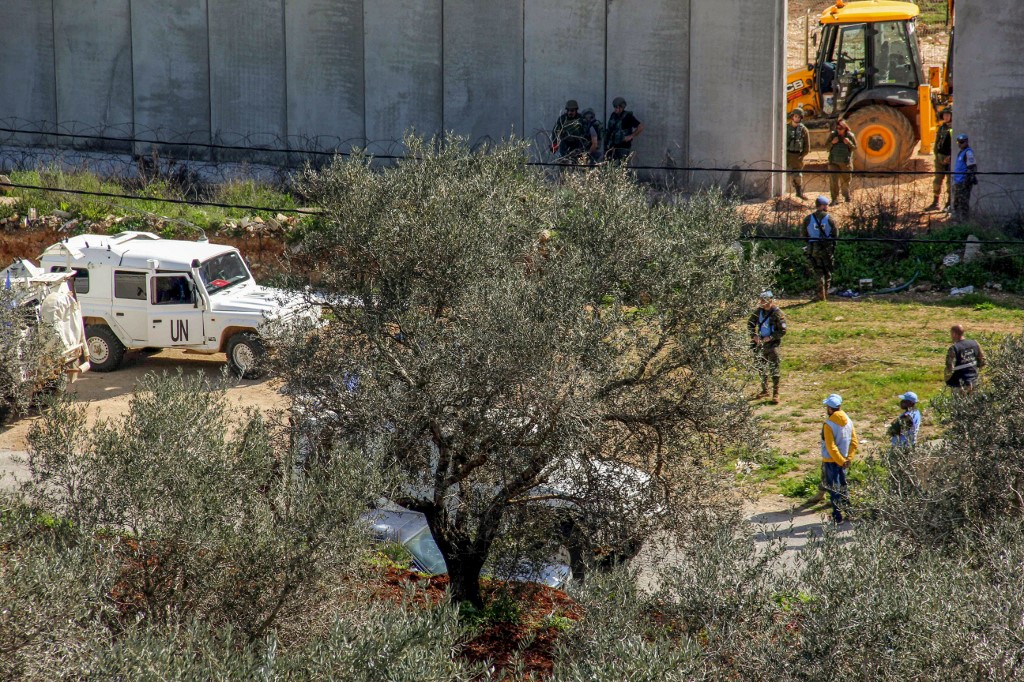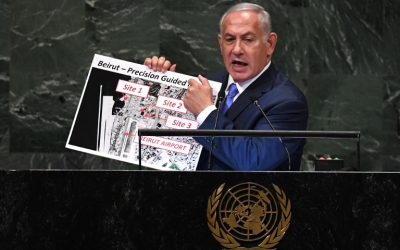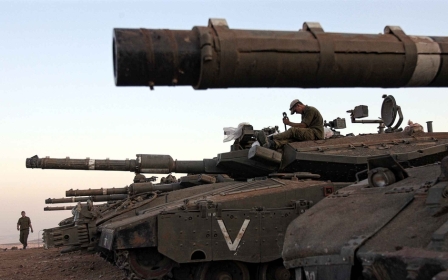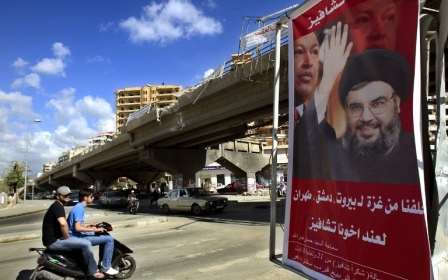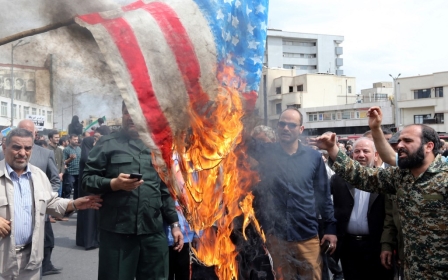The war next time: Militant theatrics on the Israel-Lebanon border
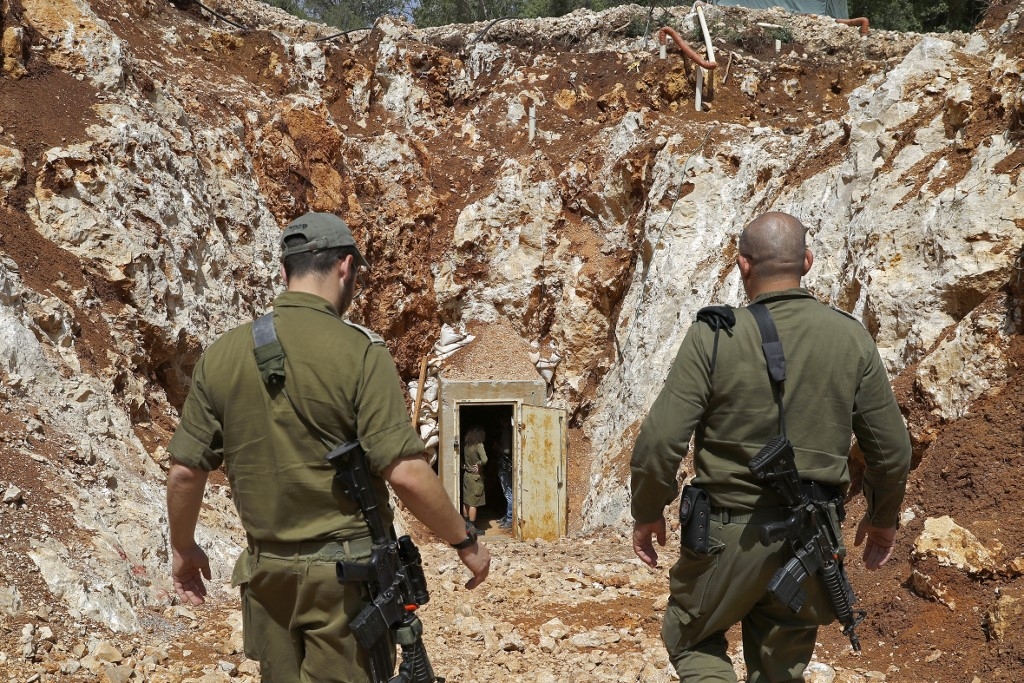
A recent Times of Israel headline announced: “Israeli army cadets train for takeover of Hezbollah-held Lebanese village.”
Lest the innocent reader deduce from this phrasing that there is in fact a specific Lebanese village held by Hezbollah facing imminent assault by Israeli cadets, the article goes on to explain that the training is merely in preparation for “a future war”.
Indeed, Israel has been talking about the next war with Lebanon since, well, the last one, which took place in 2006 and resulted in the Israeli military slaughter of some 1,200 people, the overwhelming majority of them civilians.
Brutal occupation
Granted, the concept of civilians versus combatants can be tricky in the Lebanese context, since one can assume that many Hezbollah militants wouldn’t be militants at all if Israel had not brutally occupied the country for 22 years while perpetrating periodic massacres.
New MEE newsletter: Jerusalem Dispatch
Sign up to get the latest insights and analysis on Israel-Palestine, alongside Turkey Unpacked and other MEE newsletters
At the start of the 2006 war, former Israeli army chief of staff Dan Halutz threatened to “turn back the clock in Lebanon by 20 years” - an objective that was dutifully pursued as Israel went about obliterating roads, bridges and entire neighbourhoods.
South Lebanon was particularly battered, as were Beirut’s southern suburbs of Dahiyeh - also known as a “Hezbollah stronghold” in the mindless and carnage-abetting lingo of the Western media.
As Israel persists with its perilously absurd drama vis-a-vis Lebanon, the stage is certainly set for massive tragedy
I visited the area a month after the conclusion of the war, and was able to witness the landscape of craters where apartment blocks had once stood. From this malevolent Israeli performance emerged the so-called “Dahiyeh Doctrine”, which the Times of Israel defines as a “military strategy that advocates the use of disproportionate force against a militant entity by destroying civilian infrastructure”.
So much for the Geneva Conventions.
Since 2006, many an Israeli official has felt the need to reiterate that, in any future conflict, Israel will not distinguish between Hezbollah and the Lebanese state - as though any such distinction was ever made in the first place.
Relying on propaganda
Some have taken the ball and run even further, as when former Israeli education minister Naftali Bennett suggested “sending Lebanon back to the Middle Ages”.
And yet, the role of terrorist aggressor is continually assigned to Hezbollah, an entity that owes its very existence to Israel’s terror-heavy invasion of Lebanon in 1982, which killed an estimated 20,000 people, again primarily civilians. Nor is Hezbollah the party responsible for the institutionalised terrorisation of Palestinians.
Funnily enough, Israel’s own reliance on propaganda as a modus operandi has also enabled it to displace the role of propagandist-in-chief onto Hezbollah.
In a June Haaretz article, author David Daoud cites concerns expressed by a former Israeli military deputy chief of staff about Hezbollah’s “psychological war” against Israel, summarising: “More than its rockets or fighting prowess, propaganda and theatricality will once again guarantee Hezbollah victory and continued growth” in any future conflict.
Never mind that Israel’s own militant theatrics are what’s presently threatening the entire region.
Daoud, who self-defines on Twitter as a “Lebanese-American Jew” and a “research analyst on Hezbollah and Lebanon @UANI [United Against Nuclear Iran]” - a nuclear Israel is of course A-OK! - serves up some of his own propaganda for good measure. He argues that Israel’s “media, military, and political figures are playing into” Hezbollah’s script by relaying and amplifying the group’s threats, which terrifies the Israeli public and prevents the state from “deal[ing] it a fatal blow”.
Stage set for tragedy
To be sure, fear-mongering could only possibly work on behalf of Hezbollah, and not on behalf of a state that has converted life itself into one giant military operation.
As for the prescribed “fatal blow”, we can surmise, based on the Dahiyeh Doctrine, that this might entail something along the lines of flattening Lebanon.
Thankfully, as agitation on behalf of the desired “future conflict” proceeds with vigour, there’s always the good old United Nations Interim Force in Lebanon (UNIFIL) - or not so “interim”, dating as it does to 1978 - to keep things in check. After all, nothing says peacekeeping like UN troops partaking in heavily armed shopping expeditions in southern Lebanon, while coincidentally never lifting a finger to protect the country from Israeli assault.
Another recent Haaretz article by Arnon Grunberg purports to explore the “small miracle” of UNIFIL’s ostensible conflict prevention efforts, but ends up jerking the reader from one subject to another in a stream of consciousness involving Finnish saunas, the Turkish coup attempt of 2016, and dogs that his godson likes.
He does, however, manage to touch on the theme of theatricality with his pronouncement that “war, including the prelude and aftermath, is a tragic form of absurdism complete with the necessary comic intermezzos”.
Now, as Israel persists with its perilously absurd drama vis-a-vis Lebanon - a more-than-sideshow in the current US-Israeli campaign for war on Iran - the stage is certainly set for massive tragedy.
The views expressed in this article belong to the author and do not necessarily reflect the editorial policy of Middle East Eye.
Middle East Eye delivers independent and unrivalled coverage and analysis of the Middle East, North Africa and beyond. To learn more about republishing this content and the associated fees, please fill out this form. More about MEE can be found here.



